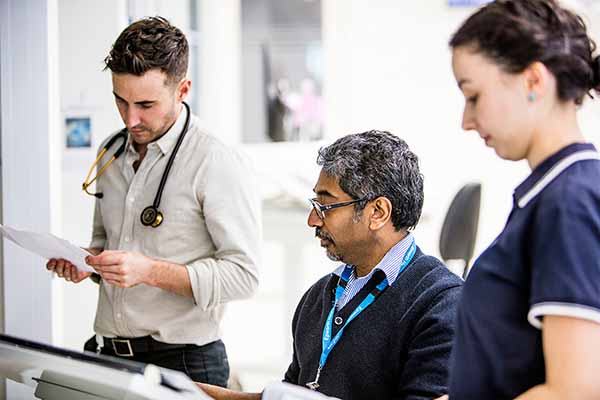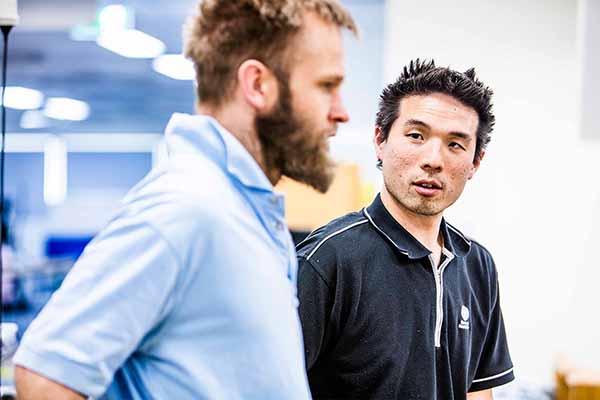Overview
-
What are the types of head and neck cancer?
There are up to 40 different types and sub-types of head and neck cancer and each is named after the area of the body where the abnormal cell growth started.
The main types of head and neck cancer include:
- Mouth (oral) cancer
Mouth cancer can include lips, tongue, inside of the cheek, jaw and gums. - Nose (nasal and sinus) cancer
Nose cancer includes the nasal cavity, sinuses behind the forehead, between the eyes and under the eyes. - Throat (pharyngeal) cancer
The throat is a tube that runs from the back of the nose to the oesophagus and trachea. - Voice box (laryngeal) cancer
Laryngeal cancer is found at the lowest part of the throat, known as the voice box. - Salivary gland cancer
The salivary glands are found on each side of the face. The salivary glands keep your mouth moist and aid digestion.
For a more extensive list of the types of head and neck cancer, please visit the Cancer Council.
- Mouth (oral) cancer
-
What causes head and neck cancer?
There are up to 40 different types of head and neck cancer and each has a specific range of risk factors that may increase your likelihood of developing cancer. If you would like to learn more, please visit the Cancer Council website.
Signs and symptoms of head and neck cancer
Each type of head and neck cancer is different and has unique symptoms.
It's natural and common for changes to occur to your body as you age or go through stressful periods. However, we encourage you to recognise what is normal for your body and if changes are persistent consult your GP for peace of mind.
Signs and symptoms of head and neck cancer can include:
- A lump in the neck or a sore throat that doesn't heal
- A persistent jaw or ear pain
- Swelling or numbness of the face or mouth
- Vision problems
Epworth fact sheet | Head and neck cancer
If you notice a change, act quickly
Diagnosing head and neck cancer
Epworth oncologists work together with your care team to use thorough diagnostic techniques to identify and treat your type of head and neck cancer.
Screening for head and neck cancer
Screening tests allow a doctor to look for cancer that has not grown enough to cause symptoms. Unfortunately, there is no screening test for head and neck cancer in Australia.
How are neck and head cancer diagnosed?
To investigate your health concerns, your doctor may schedule one or several of the following head and neck cancer tests:
Blood tests
Blood tests may be scheduled by your doctor during your first consultation to make sure your kidneys, blood and liver are functioning normally. Blood tests aren't typically used to diagnose types of head and neck cancer but can be used to investigate certain types of thyroid cancers.
Biopsy
A biopsy is the removal of a small piece of tissue that will be examined under a microscope. Your doctor may request that you undergo a biopsy to test to determine whether you have cancer or diagnose the type of cancer.
Nasendoscopy
A nasendoscopy is a common diagnostic test for types of throat cancer. A thin tube with a camera at the end, known as an endoscope, will be used by your doctor to view your nose, throat and voice box closely.
Imaging tests
Depending on symptoms, your doctor and care team may schedule imaging tests to assess or diagnose your cancer. Each imaging test provides your care team with a different view of your body. Some common scans include an Ultrasound, CT, MRI, or PET.
If you are formally diagnosed with a type of head or neck cancer, your Epworth team will schedule additional tests to stage the cancer and tailor a treatment plan to best support your health and circumstances.
Staging - Investigating the extent of the cancer
Staging helps your care team and specialists to create a unique treatment plan. During your initial diagnostic tests, your care team may be able to stage your cancer at the same time during a biopsy or CT, MRI, or PET scans.
What does my cancer stage mean?
Stage 1
The cancerous tumour is relatively small and the cancer has not yet spread to other tissue.
Stage 2
Cancerous tumours remains relatively localised but has spread to nearby tissue beyond its origin.
Stage 3
Cancer has spread regionally and affected surrounding tissue, and may have grown.
Stage 4
Sometimes called advanced cancer, stage 4 means cancer has spread to other tissue or organs beyond the region where it originated.
Find your Epworth specialist for head and neck cancer
Ear, nose and throat (ENT) specialists | Medical oncologists | Plastic and reconstructive surgery service | Radiation oncology service
Head and neck cancer treatment
We understand that treatment options can be overwhelming. Epworth specialists are here to guide and support you to make the best choice for your cancer care journey.
Head and neck cancer treatment with Epworth
Following a diagnosis of head and neck cancer, your oncologist and cancer care team will create a tailored treatment plan specific to your circumstances and stage of cancer.
Below is an overview of treatments:
Chemotherapy
Chemotherapy is a common form of treatment that involves the use of anti-cancer drugs to attack cancer cells. Chemotherapy is often used alongside other treatments such as radiotherapy or surgery.
Radiotherapy
Radiotherapy is the use of radiation to treat and manage cancer. During radiotherapy, you will likely wear a mask to ensure you stay still to help the machine target where the cancer is. Radiotherapy at Epworth is supported by the latest world-class technology and evidence-based techniques, highly experienced team of radiation oncologists, radiation therapists, physicists and nurses are committed to providing compassionate, exceptional care. If you receive radiotherapy with Epworth, you will also have significant allied health support such as dietitians, psychologists, and speech therapists.
Surgery
Surgery is a common treatment for head and neck cancer and there are several different types of surgeries.
Targeted therapy
Targeted therapy works in a different way to chemotherapy but is also an anti-cancer drug. Targeted therapy targets specific features of cancer cells to reduce the cancer growth. Targeted therapy drugs won’t necessarily work for every cancer patient, we recommend that you speak with your specialist to understand more.
Immunotherapy
Immunotherapy uses drugs to support the immune system to recognise cancerous cells. Nivolumab is a checkpoint inhibitor drug that is sometimes given to head and neck cancer patients to support their immune systems to recognise and attack cancer.
Nutrition support
Nutrition support is an integral component of head and neck cancer treatment and management. Our Epworth multidisciplinary and rehabilitation team ensure that patients receive nutritional assessment at the beginning of treatment to support their ongoing health.
Why choose Epworth for cancer care?
Epworth HealthCare is Victoria's largest not-for-profit private hospital group, renowned for excellence in diagnosis, treatment, care and rehabilitation. Epworth is an innovator in Australia’s health system, embracing the latest in evidence-based medicine to pioneer treatments and services for our patients.
Supported by excellent facilities, we integrate clinical practice with education and research to deliver outstanding patient care, each and every day.
Epworth cancer care locations
Rehabilitation with Epworth
Head and neck cancer locations:
Head and neck cancer rehabilitation
Rehabilitation doesn't just start after your treatment has ended. You may benefit from our holistic rehabilitation programs at any time throughout your cancer journey. Our programs support you to physically and emotionally prepare for treatment or restore your strength and wellbeing.
Who is the program for?
Our cancer rehabilitation program is designed for anyone diagnosed with head and neck cancer at any time from diagnosis to treatment and recovery.
Rehabilitation doesn't start after your treatment has ended. You may benefit from our holistic rehabilitation programs at any time throughout your cancer journey. Our programs can support you to physically and emotionally prepare for treatment and restore your strength and wellbeing.
What does the cancer rehabilitation program involve?
Before you start
You will meet a rehabilitation doctor and allied health team for a medical, psychosocial, and physical assessment.
Everyone's cancer care journey is different. The assessments will help the team understand your specific needs to develop the right program for you. You will work with the team to develop goals to work towards throughout the program.
During the program
Depending on your assessment and individual needs, you may complete your program:
- as part of a group, with other people, who have been diagnosed with varying cancers
- on your own
Most people will attend as an outpatient, coming to hospital for a few hours once or twice a week, over several weeks. Some people may need to stay overnight in hospital and complete a program over several consecutive days.
Either way, you will receive the same support from our team to address your physical, functional and emotional needs.
Your program may include:
- A physical exercise component to help restore movement, strength and fitness
- An educational component where you will learn about different areas associated with your cancer diagnosis and treatment and how to manage them, including:
- fatigue
- pain
- emotional wellbeing
- body image and self-esteem
- work or family challenges
- relationships
- late-onset of side effects.
At the end of your program
Our rehabilitation team will keep in touch with your referring doctor and/or treating team throughout the program and our team will keep them informed about your progress.
They will also connect you to local services and support networks so you can leave our program with the strength and confidence to live life to your fullest potential.
Who will support me during the rehabilitation program?
Depending on your needs, you may see some or all of our multidisciplinary team which includes:
- Rehabilitation specialist doctor
- Cancer nurse
- Exercise physiologist
- Physiotherapist
- Psychologist
- Social worker
- Occupational therapist
- Dietitian.
How can I access a rehabilitation program?
Referrals
A referral from your specialist or GP is required to participate.
Ask your doctor to complete the referral form at www.epworth.org.au/rehab and return it to us via fax: 03 9982 6696 or email: [email protected]
Locations
Group programs are located at Epworth Camberwell and Epworth Hawthorn.
Individual programs can be accessed at Epworth Camberwell, Epworth Geelong, Epworth Hawthorn or Epworth Richmond Rehabilitation.
Contact us
If you have any questions about our cancer rehabilitation programs, call us on: 1300 345 600.
Life after head and neck cancer treatment
Following cancer treatment, you may experience many feelings. Life after head and neck cancer treatment can pose its own challenges but our Epworth specialists are here to support you.
Life after treatment
Life after head and neck cancer treatment can be a mixture of emotions. You may not 'bounce back' as quickly as you like, but be kind to yourself and start making plans with your family or carers.
Remember that:
- You may still feel fatigued for a while after finishing treatment.
- If required, make an advanced care plan.
- Ask for help. If your body has changed due to treatment, remember help is out there to support you to feel your best and regain your sense of identity and self-esteem. Speak with your care team about options to support your general wellbeing after treatment.
Follow-up appointments
If you’re in remission for head and neck cancer you will likely need follow-up appointments to ensure abnormal cells have not returned and to check in on your overall wellbeing.
Managing your health and wellbeing ongoing
Knowing how to best manage your wellbeing ongoing is an essential step toward recovery. We encourage people who have been living with head and neck cancer to reach out to support groups such as Head and Neck Cancer Australia.


